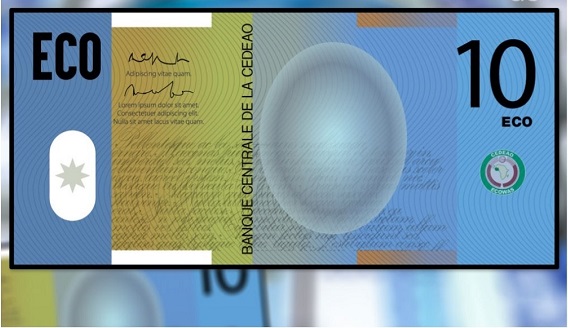The technical committee for the Eco will soon publish a report on how best the new currency can be implemented.
Working on the 2020 deadline for the introduction of the single currency the ECO, the technical advisor to the Governor of the Bank of Ghana Dr Christian Ahator said they will soon put together a report for the consideration of the Heads of State.
"We will prepare a report which is called state of preparedness report, so we will come up with that report to tell Head of states where we are. The report will actually tell the head of states whether we should go on or not but that report is yet to be prepared."
Commenting on the politics and technicalities involved, Dr Christian Ahator explained that they will do their best to outline the challenges that may be associated with the launched of the currency.
"This single currency project is a political project as well as..., we still are depending on the Heads of State their decision is final, now what we can do at the technical level is what are those things that we need to put in place if they insist that 2020 the currency should be launched? we will clearly tell them the challenges or the unresolved issues that one we will be clear on that frontÂ
ECOWAS Heads of State are also expected to hold an emergency meeting later this year to consider the technical report of the English speaking countries in West Africa.
Eco
A lot of the impetus for this change comes from the Economic Community of West African States (ECOWAS), a regional grouping of 15 countries established in 1975. For more than 20 years, ECOWAS has sought to establish a common regional currency in order to remove issues caused by trade barriers and to boost economic growth in a region that has over 380 million people living in it.
While the 8 countries (most of them French-speaking) in the West African Economic and Monetary Union (WAEMU) bloc reached agreement in December to start moving away from the CFA franc, some issues still remain. The agreement would see the countries no longer having to keep half their reserves in France (something they had to do as France guaranteed the CFA franc).
READ ALSO : Ghana’s informal sector records 5.9% growth in 2019
However, the new currency would be pegged to the Euro and that pegging would be guaranteed by France, something that is making Anglophone countries in the area such as Nigeria and Ghana reluctant to join, especially as France would have a seat on the ECOWAS board as a result.
The Covid-19 Crisis Severely Impacts the Original Plan
The original plan was to roll out the new currency sometime in 2020. But there are two hurdles that stand in the way of that ambitious timetable. The first of those is that the criteria set for economic convergence included any countries involved keeping their public debt lower than 70% of GDP and also having inflation in single figures. As of December, only Togo – one of the smallest countries in the region – had met that criteria. The second hurdle is the current Covid-19 crisis which is severely impacting the global economy. With the next ECOWAS meeting schedule for June of this year, it remains to be seen whether it will go ahead as planned.
Nigeria and Ghana are both looking at the proposals in more detail and Nigeria has stated that they will respond later in 2020. Ghana is enthusiastic about the plan but are insistent that any exchange rate must be flexible and the Governor of the Bank of Ghana has said that issues surrounding the new currency will take time to resolve.
Â
Â





